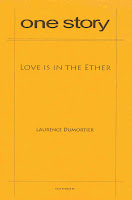> I am not a fan of the second person in fiction. It almost always has the feel of gimmick to me and is rarely warranted. This story (“Love is in the Ether” by Laurence Dumortier in One Story) may come close. Although the speaker and the “you” in the story seem to be the same person, the mother of the boy who, we learn in the first sentence, has died. As her children were growing up, she saw herself as their mother, but now that he is dead, and her daughter is independent, it’s as if she’s a different person, and so she can address herself as “you.” Maybe. I’m not completely convinced, and I think I actually would like be inside the head of this woman instead of being forced into the distance that second person demands.
I am not a fan of the second person in fiction. It almost always has the feel of gimmick to me and is rarely warranted. This story (“Love is in the Ether” by Laurence Dumortier in One Story) may come close. Although the speaker and the “you” in the story seem to be the same person, the mother of the boy who, we learn in the first sentence, has died. As her children were growing up, she saw herself as their mother, but now that he is dead, and her daughter is independent, it’s as if she’s a different person, and so she can address herself as “you.” Maybe. I’m not completely convinced, and I think I actually would like be inside the head of this woman instead of being forced into the distance that second person demands.
Having said that, the prose is fluid and beautiful, the story touching.
“Not long after the funeral you and your husband separate. Something about death has made the absence of life in your marriage apparent, indeed achingly obvious. And with your baby gone and your oldest about to be married, your motherly duties seem abruptly over and your family exploded. Your husband agrees. He is hollow and gray with sorrow, too weak perhaps to disagree.”
Revealing the son’s death in the first sentence was absolutely the right choice here and while the conclusion feels a bit too expected, at least the reader doesn’t feel manipulated along the way.

>I was moved by this story. A child’s death is material that’s very hard to pull off, but the writer managed to steer clear of sentimentality or numbness. I agree that it was the right choice to tell us of the son’s death right at the start. The end felt too “hopeful” to me, but then I doubted myself for wanting to deny the narrator this little bit of something good.
>I loved this. Just read it last night and found it very moving. I like second person, though–and in this case I felt it was very much a first person account, thinly veiled to “protect” the narrator from her emotions.